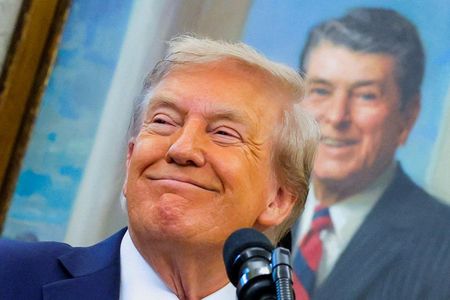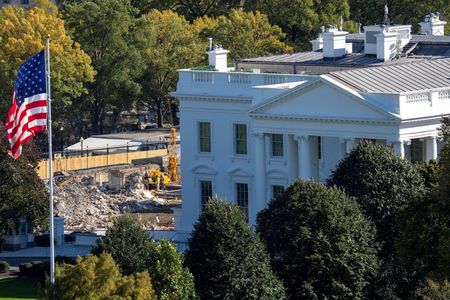This was a week in which Trump posted an AI-generated video of himself, wearing a crown, dropping a planeload of feces on protesters. He also pardoned a convicted crypto kingpin who has worked to enrich the Trump family’s company, and he asked the DOJ to pay him millions for legal costs incurred when the government he now controls investigated him. He also seems to be going to war with Venezuela.
Clip: How Trump defies all norms of presidential behavior
Oct. 24, 2025 AT 8:57 p.m. EDT
TRANSCRIPT
Notice: Transcripts are machine and human generated and lightly edited for accuracy. They may contain errors.
Jeffrey Goldberg: In the category of things that presidents don't do, this video, which I'm not going to show because it's gross and this is PBS. What does this -- this is almost a history question. What does that sort of thing do to the presidency itself? Go ahead. Go ahead, David.
David Ignatius: It demeans. It takes it to a level of vulgarity and crassness. You know, it demeans our country in the eyes of the world. I find more and more of my friends from other countries look at this behavior with a kind of revulsion. It just it's not the America that they understand, but it's just not -- it's not appropriate behavior.
Jeffrey Goldberg: Right.
David Ignatius: And, you know, I keep -- in a sense, this is a character test for our country. What kind of people are we as we watch this, if people, you know, applaud it, laugh at it, think it's funny to dump the excrement on protesters wearing a crown. If that becomes the acceptable norm, you just worry that we really are becoming a sort vulgar nation of this public circus, that's the presidency under Trump, and that, you know, it's, it is just a very dangerous direction.
Jeffrey Goldberg: Let's talk about another subject related to impunity, and let's start by listening to the president talk about some of these activities in the Caribbean and on the Pacific side as well.
Reporter: If you are declaring war against these cartels and Congress is likely to approve of that process, why not just ask for a declaration of war?
Donald Trump: Well, I don't think we're going to necessarily ask for a declaration of war. I think we're just going to kill people that are bringing drugs into our country, okay? We're going to kill them, you know? They're going to be like dead, okay?
Jeffrey Goldberg: David you wrote in your column this week on the subject of Venezuela, why America slept. That might be the title of a future book, examining the Trump administration shift of national security focus away from a mounting Russian threat against Europe, and toward a noxious, but relatively impotent network of drug gangs in Venezuela. Go into this a little bit.
David Ignatius: So, to me, the mismatch of our national security priorities has been stunning. The Venezuela regime of Nicolas Maduro is noxious, as I said in the column. You know, it's a despotic regime, but it's not a global threat to the United States.
Meanwhile, Russia is increasingly waging an open covert action against Europe and NATO. It's sending drones, it's sending saboteurs, it's threatening assassination. And Europeans feel they are on the edge of a war with Putin who will -- that will change the map for a generation.
Jeffrey Goldberg: Right.
David Ignatius: And this mismatch I think is stunning.
And what is Trump trying to do in the idea of sailing the largest aircraft carrier in the world toward the coast of Venezuela? To what end? I mean, if you're going after drug traffickers, I don't think you need the USS Ford.
Jeffrey Goldberg: Right. Susan, why Venezuela? Why now?
Susan Glasser: You know, I think David is making an extremely important point because I think it's, sure, part of the performative optics of the Trump presidency, right? He's renamed, not in a legal sense, but in his own sense, renamed the Defense Department the Department of War. Well, once you create a Department of War, then you need a war to go along with it.
Now, he's in a little bit of a conundrum since he's spent years telling his followers that he's the president of peace, that he's not going to go to war. So, it strikes me that he's operating in that sort of Trump bully mode which some previous presidents of both parties have done in our own hemisphere, unfortunately, seems to me that he's essentially punching down, looking to create a kind of a short, victorious, optics-driven conflict with shadowy, amorphous, bad guys, never getting Congress involved in it.
At the same time, I think that not only is Trump ignoring the bigger national security threat, but it seems to be part of a conscious shift in the administration's view of what is national security. Donald Trump made a very important comment right before the 2024 election. He was asked about national security threats and he said, well, you know, you have Russia, you have China and then you have the enemy within. And of those, the enemy within is the greater threat.
And I think what you're seeing is the pivoting of the role of the U.S. military, deploying troops in the streets of American cities where Donald Trump doesn't like, the Democratic leadership pivoting to a focus on the Western Hemisphere, which is what he's done with a lot of the resources at the Pentagon. I think this is a very significant shift that we're seeing right now, Jeff.
Jeffrey Goldberg: Right. Peter, will he actually go to war?
Peter Baker: Well, I mean, the way he is, right? I mean, the way he is -- you know, he's using military force against non-military targets that are not an imminent threat in the conventional sense of what they --
Jeffrey Goldberg: Well, the truth is we don't know who were on those boats. They have not told us who are on those boats.
Peter Baker: No due process. And the two guys that they did rescue from one of those things, they then sent back. They didn't have enough to prosecute him, even though they would've had enough to have killed them, and a bombing. And so it's a remarkable thing.
Now, we've been heading down slippery slope in this way for a while, right? Remember, under Obama, he used military force to kill American citizens who were designated to be terrorists. And people thought that's a really extraordinary expansion of executive power. That person's never been convicted of anything. Well, now, Trump is taking it the next step by leaps and bounds and going after these boats that may or may not have the people he says on them and may or may not be doing the things he's saying that they're doing, and, in any case, are not in an imminent threat to any Americans.
Jeffrey Goldberg: Toluse, all of this is happening during a government shutdown, and you've been covering the shutdown quite extensively. You wrote this week, the president has taken extraordinary steps of the past three weeks to weaponize the closure of the government, steering federal funds to shield his chosen beneficiaries from the shutdowns harms, even as he opportunistically damages the interest of his opponent. What are those steps that he's taking that are -- that you describe as frankly partisan?
Toluse Olorunnipa: Well, they've stripped more than $35 billion away from, quote/unquote, blue states because of --
Jeffrey Goldberg: And they've articulated it that way.
Toluse Olorunnipa: Yes. They've specifically listed the states. In some cases, they've targeted states led by Minority Leader Chuck Schumer in the Senate and other top Democrats, saying that because you are in favor of the shutdown, we are going to take money away from your constituents. But a lot of those constituents, first of all, they are Americans, so they're constituents of the President and Congress, but they're also, in some cases Republican districts within these blue states that are being hurt by this.
Now, the president has said that he's going to take money away from certain parts of the government and steer them towards people that he likes, like the military and other programs that he thinks should be funded. He's even said you, we're giving money to the people we want to give money to, and the Democrats are being killed by this shutdown. And he's not really taking a role of trying to solve this problem. He's trying to weaponize it and get partisan gains from the situation of being in a shutdown for four weeks. And we're very close to a situation where a lot of people are going to be hurt by SNAP money running out, and other programs that people rely on in addition to government paychecks not being there for anybody anymore.
Jeffrey Goldberg: Right. This is sort of a quick round robin of all the things that's called all the things that happened this week. One of the things that happened this week is that the president has asked the Justice Department to reimburse him for $230 million in legal fees that he says he incurred while defending himself from the Justice Department.
Peter, he controls the Justice Department, seems somewhat likely that he's going to get paid.
Peter Baker: Well, even he said it was awfully strange that it would be up to him to decide whether to pay him using money. By the way, when we say Justice Department, we should use the word taxpayers, because that's what we're talking about. These are the taxpayers who would be paying the president of the United States $230 million. And I don't see him volunteering to give money to Hillary Clinton, or for that matter, Peter Strzok, or Lisa Page, or any of the other people who've been investigated over the years who didn't get charged and didn't get convicted, but he himself, of course, is only concerned with his own grievance, his own sense of resentment for the government, persecution complex.
And so the idea that the government is going to pay $230 million to the president of the United States is just unheard of. We're beyond unprecedented wow. We should just retire that word because it doesn't even come close.
Jeffrey Goldberg: Right. David, last word to you. This week just seems to -- it's been a pile up of things that we've never seen before. Is this now the crisis?
David Ignatius: So, you know, we've seen a week where the president asserts essentially unlimited power, and it's the culmination, feels like the culmination of a process has been going on, gathering strength for nine months now. I think we're all waiting for the Supreme Court to say, no, there are limits to your power. And I think the greatest fear a lot of us have is that when this finally gets to the court, the court will ascent, exceed to this level of unitary, unlimited power, and then we're in a really different place.
Jeffrey Goldberg: Right. Well, I mean, this is our continuing subject on this show. And we'll come back to it, but now we have to go to sports traffic and weather on the eighth. David Ignatius will be doing the traffic report from now on at Washington Week as we expand our footprint across Washington.
Anyway, we do have to leave it there for now. These issues we'll be revisiting next week. I want to thank our guests for joining me, and I want to thank all of you at home for watching us.
FROM THIS EPISODE


Clip: Trump's unchecked power and unapologetic impunity


Full Episode: Washington Week with The Atlantic full episode, 10/24/25

© 1996 - 2026 WETA. All Rights Reserved.
PBS is a 501(c)(3) not-for-profit organization
